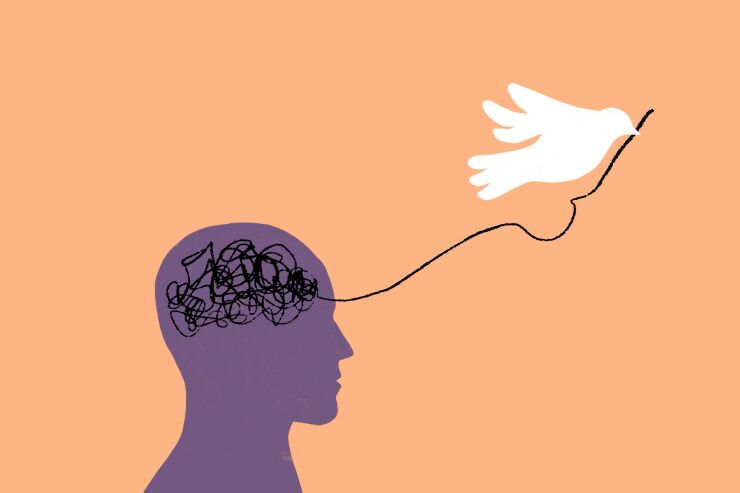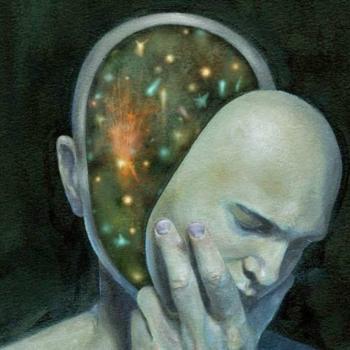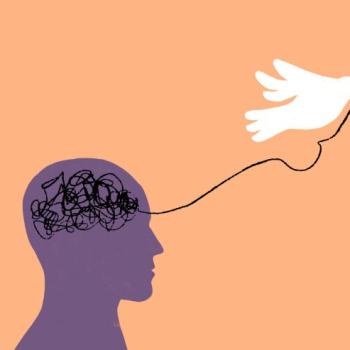
As a person who’s had to struggle with acute mental health issues, I’m intimately familiar with the interaction of faith and mental health, for good or for ill. I want to be clear on the most important matter – God is only good, all the time. He is a God of love, and all unfiltered interaction with him can only be a wonderful thing, but the filters we apply to that interaction can confuse, reduce, and even pervert the impact of faith on our lives. If there’s poison in the pot, the whole batch is undrinkable.
The easiest way to demonstrate how different approaches to faith can both help and hinder mental wellbeing is to use examples from my own experience. I’ve been at both ends of the scale, and so understand this on a very real level.
In my early twenties, there were unhealthy elements which filtered my faith and exacerbated struggles with anxiety. I wouldn’t have admitted this at the time, but I was trying to earn the favour of God. As a deeply insecure and damaged person, I’d plugged into faith as a route to self-esteem – not consciously, of course, but in the deeps of my subconscious. On the surface, I was serving God with admirable zeal, ministering to people wherever I went, attending all-night prayer meetings, preaching, teaching, and evangelising. People looked up to me, and my needy subconscious fed on that, but more importantly, it fed on the idea that my devotion made me special in God’s eyes. Again, these are not motivations I was aware of at the time, but the decades since have gently revealed the truth.
In the end, zeal drove me to a breakdown. I was working too hard, never taking a break, and had become a grave and sombre person. One night, my mind wouldn’t stop whirring. I’d delivered a 90-minute sermon at a church in Papua New Guinea and had become obsessed with the material, re-running the talk over and over in my mind. I tried to relax, to stop thinking, to drift off to sleep, but my thoughts were spinning like a top and wouldn’t slow down. I became frightened, caught in the grip of anxiety, and when the morning came, I found my closest friend and begged for her help. We began to pray, and the Lord spoke to me with bone-shaking clarity:
“I’m going to set you free from this faith teaching!’
I could feel his fury – not at me, but at the distortion of faith I had bought into. I was stunned. When I’d first come across the teachings of Kenneth Copeland, they had liberated me from the unhelpful religious traditions of my church upbringing. Through faith teaching, I’d learned that God is only good, all the time – that his love is expressed to us in ways that make sense to human beings, rather than through some painful, inscrutable plan – but this particular brand of teaching has pitfalls of its own, including the imposition of pressure to receive the blessings of God. Every time the missionary ship I lived on left port, I would go to the bow and command the wind and the waves to be calm. Faith teaching had taught me that we are God’s hands and feet in the Earth, and that responsibility fell on us to impose the Kingdom of God on our surroundings. If I got sick, I’d never take the time to rest. Instead, I’d carry on with my day to day duties while commanding my body back to health. This unhealthy, pressurised version of faith was another of the unhelpful filters through which the love of God had to pass. There was poison in the pot.
In response to God’s clear message – that he would set me free from faith teaching – I immediately cast all pressure aside. My mind swiftly relaxed, and suddenly I was no longer on the cliff edge, though the experience left me exposed. In the following years, anxiety plagued me on several levels, and I found it hard to believe I would ever recover. The damage was well and truly done. After all I’d been through, it would have been easy to blame faith for my ills and walk away, but I always knew that God was good. The damage had been largely self-inflicted, empowered by a lack of reliance on God’s unconditional love.
The road to recovery
In the end, it was faith that catalysed my healing from the worst impacts of anxiety, which in my case were extreme. 18 months after leaving the ship, I attended Ellel Ministries – a Christian organisation that invites those in need of support to a free, three-day healing retreat in a gorgeous mansion near Lancaster, England. Three counsellors were allocated to each person, and mine were wonderful, caring people. I met with them several times a day for the full three days of the retreat, talking about and praying into my struggles. All three counsellors were sensitive to the Holy Spirit and relied on his leading as we explored the roots of anxiety. We revisited my earliest experiences of anxiety and then dug further into my childhood.
The bottom line was that during my earliest fearful experiences, I’d become tense and defensive, desperate to protect my emotional state. I’d become my own protector – a natural and sensible response in a young child, but it led me to a form of continual readiness to defend myself when negative emotions arose. In essence, I was brittle and ready to shatter, which I eventually did.
After hours of talking and praying with my counsellors, the message of the Lord became clear – he wanted me to stand aside as my own protector and appoint him instead. He spoke to me through the words of Deuteronomy 33:26
“There is no one like the God of Jeshurun,
Who rides the heavens to help you,
And in His excellency on the clouds.”
The whisper of God was drenched in compassion and full of fervour – he would ride the heavens to help me, if I would let him.
I knew what to do. I renounced my self-protection and accepted the protection of God instead. When fear next arose, I would resist the temptation to engage in distraction techniques and would simply step aside, trusting him to protect me. The promise was that if I ceased fighting, God would fight in my place – the peace of God would actively guard my heart and mind. Philippians 4: 6-7,
Be anxious for nothing, but in everything by prayer and supplication, with thanksgiving, let your requests be made known to God; and the peace of God, which surpasses all understanding, will guard your hearts and minds through Christ Jesus.
Even before this was put to the test, I knew I was free. The breakthrough had occurred. My counsellors knew it too – there was a moment when we all looked at each other and one of them wept with relief. They were lovely people to whom I owe at least the quality of my life, if not my life itself. I don’t think I could have gone on much longer.
The first test occurred on the way home. Anxiety reared its head and I was tempted to distract myself. My heart rate shot up, but instead of trying to subdue it I muttered to myself:
“I don’t defend myself; I let the Lord defend me.”
Throughout the previous 18 months, the anxiety had only intensified until I fearfully sought distraction, but this time it was different. Instead of escalating, the fear began to fall away. My heart rate slowed, and before long I was thinking about something else altogether. I was stunned, staggered, delighted, and oh so grateful. My Lord had set me free!
in the 24 years since the healing retreat, anxiety has never taken me the way it did before. I’ve had a few hairy moments when under pressure, but on each occasion I repeat the statement of faith:
“I don’t defend myself; I let the Lord defend me.”
I’ve learned to continually step aside when threatened by fear, refusing to defend myself, and the Lord has always put the anxiety to bed. Since the healing retreat, I’ve never been overcome by fear and have a marvellous set of tools for managing my state, all of which involve some form of surrender. Through the wisdom learned at Ellel Grange, I’ve been able to help a number of people living in the grip of anxiety and am deeply grateful for what the Lord has taught me.
The positive interaction of faith and mental health
To reiterate what I believe is the most important point, God is only good, all the time. He is never a source of darkness or trial. James 1:16,
‘Don’t be deceived, my dear brothers and sisters. Every good and perfect gift is from above, coming down from the Father of the heavenly lights, who does not change like shifting shadows.’
Faith itself is only good, but when intermixed with poisonous elements, it can become a burden. Faith is about our relationship with God Almighty, after all – what could be more important? For me, a low self-view combined with the deceit of faith teaching, pressurising me to the point of collapse.
Faith facilitated my healing when I began to accept that God’s love is truly unconditional. Healing began when I stopped trying to impress God; when I stopped trying to earn his love through service. Accepting the unconditional nature of love is the first baby step on a healthy, authentic journey of faith, in which we begin to connect with the gracious outpouring of divine love. Faith took me further still, showing me how to abandon self-protection and let God protect me instead. In the years since, faith has continued to soften me, bringing out the sweet parts of my nature and helping me love others well.
Faith is all about love – accepting the love of God for ourselves and other people. Everything else is pressure, and pressure is poison. To continue to grow, then, we must choose authentic, unpressured faith, and learn to bathe in the loving presence of our incredible God.
To look into the interaction of faith and mental wellbeing on a broader level, Radiant Foundation have recently published a wide-ranging and insightful report, which you can read here.
“According to a study published in the Journal of Health Psychology, religiosity, spirituality and frequency of prayer have been tied to lower cortisol levels. Cortisol, often referred to as the “stress hormone,” can wreak havoc on our bodies when it’s chronically elevated. But spiritual engagement appears to help us keep this hormone at bay.” Does Spiritual Practice Support Mental Wellbeing? Skylight, Jan 1st, 2021.

















